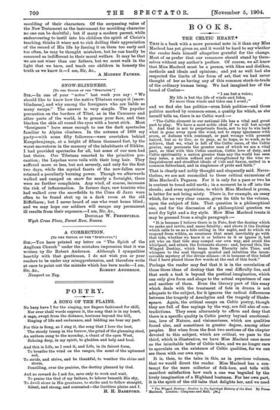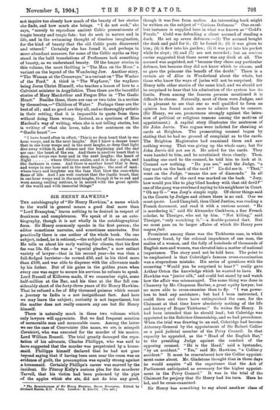THIS is a book with a more personal note in
it than any Miss Macleod has yet given us, and it would be hard to say whether
the reader feels himself altogether grateful for the change. Most of us prefer that our romances should stand by them- selves without any author's preface. Of course, we all knew that Miss Macleod must be a person, with likes and dislikes, methods and ideals and opinions ; and yet so well had she respected the limits of her form of art, that we had never thought of her as having any of this common stock-in-trade of the ordinary human being. We had imagined her of the brood of Coelus-
" I am but a voice; My life is but the life of winds and tides,
No more than winds and tides can I avail ;" and we find she has politics—even Irish politics—and those politics marked by common-sense, a quality for which, as she herself tells us, there is no Celtic word :—
" The Celtic element in our national life has a vital and great part to play. We have a most noble ideal if we will but accept it. And that is not to perpetuate feuds, not to try to win back what is gone away upon the wind, not to repay ignorance with scorn, or dulness with contempt, or past wrongs with present hatred, but so to live, so to pray, so to hope, so to work, so to achieve, that we, what is left of the Celtic races, of the Celtic genius, may permeate the greater race of which we are a vital part, so that with this Celtic emotion, Celtic love of duty, and Celtic spirituality a nation greater than any the world has seen may issue, a nation refined and strengthened by the wise re- linquishment and steadfast ideals of Celt and Saxon, united in a common fatherland, and in singleness of pride and faith."
That is clearly and nobly thought and eloquently said. Never- theless, we are not reconciled to these critical excursions of Miss Macleod's Pegasus. For it is only for a pace or two he is content to tread solid earth ; in a moment he is off into the
clouds; and even mysticism, to which Miss Macleod is prone, is better for not being misty. There is, for example, an essay which, for no very clear reason, gives its title to the volume, upon the subject of fate. That question is a philosophical one, and for the discussion of a philosophical question we need dry light and a dry style. How Miss Macleod treats it may be guessed from a single paragraph:—
"It is because I believe there is in Fate, first the destiny which we make and invite, and name fatality ; and above it the Destiny which calls to us as a tide calling in the night, and to which we respond from within, as creatures that must inevitably go with that tide, whether we know it or believe in it or ignore it, but yet who on that tide may compel our own way, and avoid the whirlpool, and attain the fortunate shores : and, beyond this, the Winged Destiny, which leans from Eternity into Time, and whispers to the soul through symbol and intuition the incon- ceivable mystery of the divine silence—it is because of this belief that I have placed these few words at the end of this book."
Perhaps the reader may feel that it is in the correlation of these three ideas of destiny that the real difficulty lies, and that such a task is beyond the poetical imagination, which can only give form and shape to the actual experience of one and another of them. Even the literary part of this essay which deals with the treatment of fate in drama is not adequate to the subject, for it ignores the radical differences between the tragedy of Aeschylus and the tragedy of Shake- speare. Again, the critical essays on Celtic poetry, though they are full of fine sayings by the way, are full also of con- tradictions. They seem alternately to affirm and deny that there is a specific quality in Celtic poetry beyond emotional- ism, love of Nature, and visionariness, which are qualities found also, and sometimes in greater degree, among other peoples. But when from the first two sections of the chapter devoted to this subject, which are critical, we pass to the third, which is illustrative, we have Miss Macleod once more as the inimitable teller of Celtic tales, and we no longer care to speculate on the existence of Celtic qualities, for we can see them with our own eyes.
It is, then, to the tales in this, as in previous volumes, that we would direct the reader. Miss Macleod has a con- tempt for the mere collector of folk-lore, and tells with manifest satisfaction how such a one was beguiled by the lively imagination of a Highland boatman. For her own part, it is the spirit of the old tales that delights her, and we need
• The Winged Destine 1: Studies in the Spiritual History of the Gael. By Fiona Macleod. London; Chapman and Hall. [68.] not inquire too closely how much of the beauty of her stories she finds, and how much she brings. "I do not seek," she says, "merely to reproduce ancient Celtic presentments of
tragic beauty and tragic fate : but do seek in nature and in Edo, and in the swimming thought of timeless imagination, for the kind of beauty that the old Celtic poets discovered -and uttered." Certainly she has found it, and perhaps in more abundant measure, for some of the Celtic myths as they stand in the bald translations of Professors lack something of beauty, as we understand beauty. Of the longer stories in this volume, the most thrilling is "The Man on the Moor," a variant on the legend of the Wandering Jew. Another gory, -" The Woman at the Crossways," is a variant on" The Washer of the Ford." A third is "The Wayfarer," the wayfarer being Jesus Christ Himself, who teaches a lesson of love to a Calvinist minister in Argyllshire. Then there are the beautiful stories of Mary MacArthur and Fergus Dhu in "The Gaelic Heart." Besides these, there are one or two tales in a section by themselves,—" Children of Water." Perhaps these are the best of all ; and so good are they all, and so thoroughly artistic in their setting, that it is impossible to quote from them without doing them wrong. Instead, as a specimen of Miss Macleod's way of writing, when she is not telling stories, but is writing of what she loves, take a few sentences on the -" Gaelic heart" :—
" I have heard often in effect, 'This is no deep heart that in one hour weeps, and in the next laughs.' But I know a deeper heart that in one hour weeps and in the next laughs, so deep that light dies away within it, and silence and the beginning and the end are one : the heart of the sea. And there is another heart that is -deep, and weeps one hour and in the next laughs : the heart of sight where Oblivion smiles, and it is day ; sighs, and the darkness is come. And there is another heart that is deep, Lad weeps in one hour and in the next laughs : the soul of man : where tears and laughter are the fans that blow the rose-white flame of life. And I am well content that the Gaelic heart, that in one hour weeps and in the next laughs, though it be so sad and worn among smiling nations, is in accord with the great spirits of the world and with immortal things."



























































 Previous page
Previous page